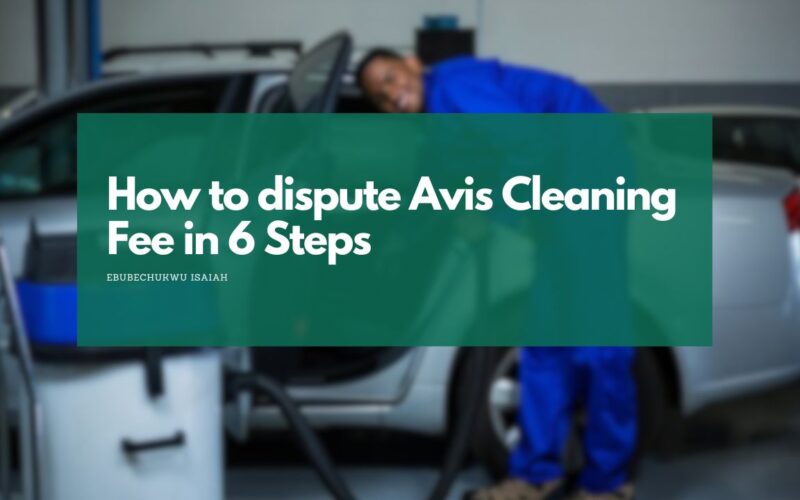As an Amazon Associate, I earn a small commission from qualifying purchases. Learn more about this.
Over the past few years, an increasing number of car rental customers have reported unexpected cleaning fees.
Avis, being a major player in the industry, is not exempt from such disputes.
For renters who believe they’ve been charged unfairly, the process of disputing these fees can seem daunting.
This guide is here to help you simplify the process and potentially save your hard-earned money.
Understanding the Cleaning Fee
When you rent a car, be it from Avis or another provider, you enter into an agreement that you’ll return the vehicle in roughly the same condition in which you received it.
This doesn’t mean it needs to be spotless, but it shouldn’t be excessively dirty either.
Generally, normal wear and tear or a bit of dust from your travels is expected and accepted.
But if there’s substantial dirt, spills, or rubbish that requires additional cleaning, that’s where the cleaning fee enters the stage.
The cleaning fee, simply put, is a charge applied by the rental company to cover the costs of bringing the vehicle back to a rentable condition.

If the car is returned with a stained seat, for example, it can’t be rented out again until that’s been addressed. Avis and other rental companies detail this in their rental agreement, specifying that a fee will be applied if the vehicle requires more than the usual light cleaning.
The sticky point, however, is determining what constitutes ‘usual’ or ‘excessive’ when it comes to dirt and cleanliness. It’s somewhat subjective, isn’t it?
One person’s acceptable might be another’s excessive.
Avis states that the fee is applied “when a car, in Avis’s sole opinion, requires more than the standard amount of cleaning to remove dirt and stains that have accumulated during the rental period.”
But without clear, publicly available guidelines on what is “standard” or “more” in this context, disagreements naturally occur.
Generally, these are the 4 main things to keep in mind that could impose a cleaning charge.
- Stains on the upholstery or carpet: This can be from food, drinks, or other spills.
- Smoking: If there’s evidence of smoking, such as ash or a strong odor.
- Pet hair or damage: If you’ve had a pet in the car and it left behind a mess or damage.
- Excessive mud or dirt: Especially if it’s more than what would be expected from regular use.
However, the challenge arises when customers believe they’ve returned the car in a decent condition and still get hit with this fee.
Let’s talk about this properly in the next section.
How to dispute Avis Cleaning Fee
1. Gather Evidence:
Preparation is Key: Before you even start the engine of your rental car, make it a habit to do a thorough check.
Use your smartphone to take clear photos and even videos of the vehicle’s interior and exterior, emphasizing areas that are more susceptible to wear, tear, or dirt, like seats, carpets, and the dashboard.

It’s also wise to note the car’s overall cleanliness upon pick-up, so you have a baseline. If a dispute arises later, having date-stamped evidence can make a significant difference.
2. Review the Rental Agreement:
Details Matter: The rental agreement is more than just a mundane document – it’s the contract that dictates the terms of your rental.
Although it might seem tedious, comb through the fine print related to vehicle return conditions and potential cleaning fees. By being informed of their policies, you’ll be in a stronger position to dispute any unjust fees.
3. Contact Avis Customer Service:
Often, a simple conversation can lead to resolution.
Reach out to Avis’s customer service, either through their helpline or a dedicated service email. When discussing the issue, always remain calm, polite, and assertive.
Present your evidence and ask them to clarify why the fee was imposed. Sometimes, an internal review can lead to the fee being dropped, especially if it’s evident that the charge was applied in error.
4. Dispute the Charge with Your Credit Card Company:
If your discussion with Avis doesn’t yield a satisfactory result, your credit card company can be a powerful ally.
Most credit card providers have a system in place for customers to dispute unjust charges. Once you raise a dispute, they will conduct an independent investigation.
Not only does this put the onus on Avis to justify the charge, but during the investigation, you are typically not obligated to pay the disputed amount.
Remember to provide your credit card company with all the evidence and details to bolster your case.
5. Utilize Social Media:
In our interconnected world, a company’s reputation on social media platforms can be crucial to its success.
If you believe you’ve been unjustly charged and traditional channels aren’t helping, consider sharing your story online.
Platforms like Twitter, Facebook, and even travel-specific forums can be effective.
When doing this, aim for a balanced tone—being overtly negative or aggressive can sometimes backfire. Instead, present the facts, share your evidence, and tag Avis’s official handles.
Many companies prioritize such public feedback and might expedite your issue’s resolution.
6. Seek Mediation:
In cases where you’re at an impasse with Avis and feel strongly about the unjust charge, consider turning to mediation.
This is a process where an impartial third party helps both sides reach a consensus. Some consumer protection agencies or local chambers of commerce offer mediation services tailored to resolve disputes between businesses and customers.
Although it might seem like an extreme step, sometimes having that neutral perspective can lead to an amicable solution for both parties.
Conclusion
Unexpected fees are always an unwelcome surprise.
While Avis and other car rental companies have every right to maintain their fleet’s condition, it’s essential that charges are fair and transparent. If you find yourself facing an unexpected cleaning fee, remember that you have options and rights as a consumer.







